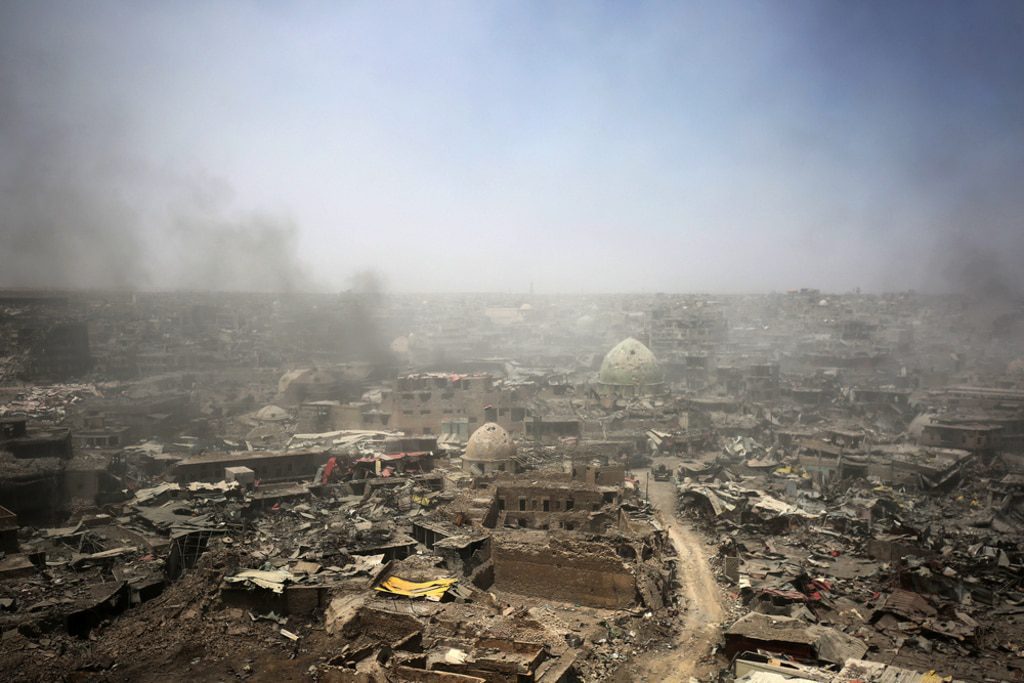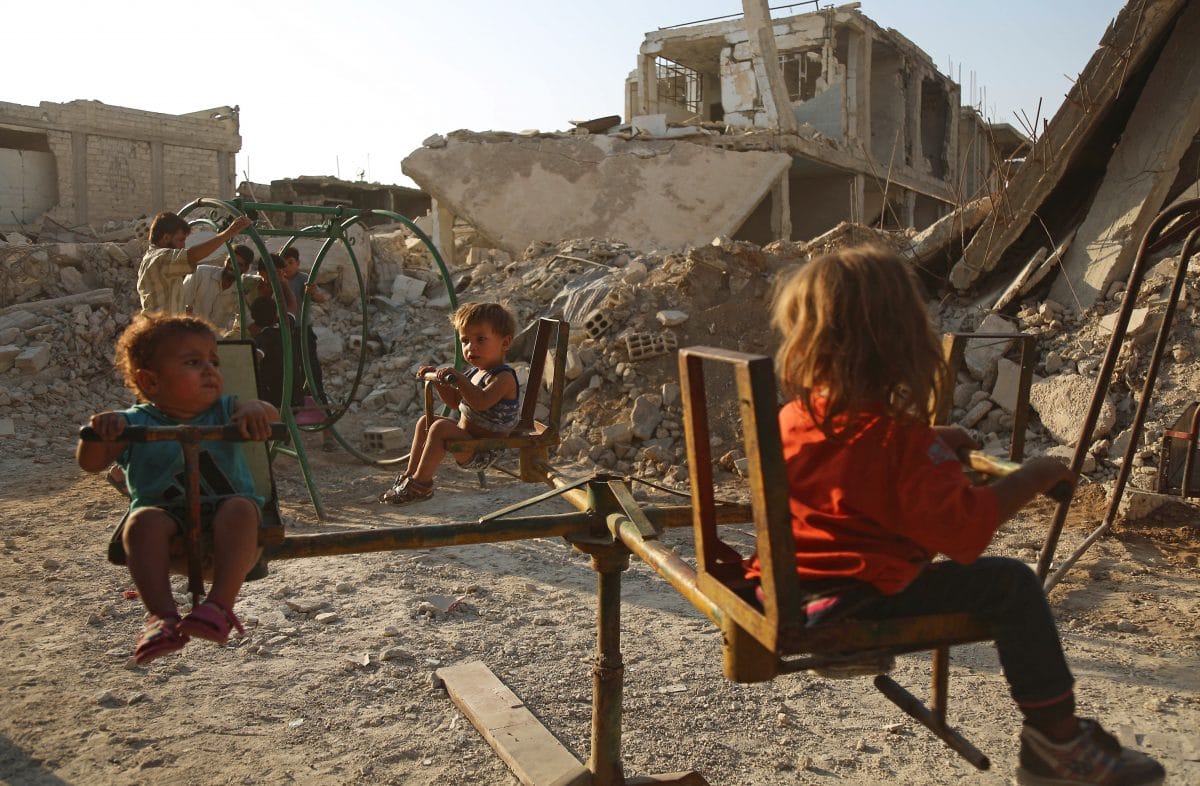Beyond the immediate consequences of the conflicts in Iraq and Syria, the environmental degradation could have a far-reaching impact.

The war in Syria, now in its sixth year, has been ferocious and deadly. In 2016, the death toll was estimated at 400,000. In Iraq, the fight against the Islamic State (IS) has destroyed cities and displaced around 3.3 million people. Yet beyond the immediate consequences of these conflicts, the environmental degradation in both countries could have a far-reaching impact.
In a country at war, preserving the environment is not usually a high priority. However, it is a key issue that must be addressed before rebuilding begins. According to Living under a black sky, a report published by the Dutch peace organization PAX in November 2017, Iraq was severely affected even before the [IS] attacks in 2014 by the legacy of three wars and climate change, resulting in weak environmental governance and more frequent droughts. ‘Since then, you can also add illegal oil refineries, spills and fires, as well as debris, dust and decline of water infrastructure,’ the report said.
“We have been monitoring what’s happening in Iraq since IS took over,” Wim Zwijnenburg, PAX’s project leader in humanitarian disarmament, told Fanack Chronicle. “There was a lot of fighting around the oil refineries in the northern territories; we noticed severe pollution. When the Iraqi army pushed back IS, they started to set oil wells on fire, flood areas, damage wells and pipelines, and pollute water.”
According to the report, the most visibly affected areas are the Hamrin Mountains, where two oilfields were on fire for two years, Qayyarah, where the last fire was extinguished in March 2017, the contaminated River Tigris, Baiji, whose oil refinery is severely damaged, and Kirkuk, where almost all the oil infrastructure has been attacked. By pushing back IS, the coalition also contributed to oil spills and damaged infrastructure, adding to the pollution created by the jihadist group. Agricultural lands and water sources were compromised as a result.
IS also set the Mishraq sulphur plant on fire, releasing toxic smoke that resulted in the hospitalization of more than 1,000 people, 20 of whom later died. Other sites used to produce chemical weapons or mismanaged during the war have been hit by air strikes, which could result in long-lasting toxic air and ground pollution.
“In most populated areas like Mosul, Fallujah and Ramadi, there will be a mixture of all kinds of waste, which will affect the exposed population or workers removing rubble, as well as military remnants, destroyed tanks or vehicles containing chemicals,” Zwijnenburg said. “What’s obvious now is that we need to start monitoring health and the environment to see what the actual impact is in order for the government to find solutions. From a survey we conducted through our contacts on the ground, we discovered that people in heavily affected areas are very concerned about the impact of pollution on health.”
United Nations Environment Programme (UNEP) helps countries like Iraq address the consequences of conflicts. In September 2017, the organization published a technical note about Mosul, in which it estimated that the quantity of conflict debris in the city is 11 million tons. “Environment can be used as a kind of weapon of war in that sort of strategy within a conflict to increase the damage to the local population,” Oli Brown, coordinator in UNEP’s disasters and conflicts subprogramme, told Fanack Chronicle. “It’s a tactic that has been used for thousands of years. The environment is always affected by war, and environmental damage, from our perspective, complicates recovery and worsens the humanitarian crisis. We see that very clearly in Iraq and Syria.”

In Syria, one of the most critical aspects of the environmental crisis is the illegal refineries – more than 10,000 in 2016, according to PAX – that are being set up all over the country. “Due to bombardments and lack of staff who fled or left the country, professional refineries have drastically cut back their production,” Zwijnenburg explained in the report. “At the same time, the demand for fuel for daily life remains high. Armed groups including the Islamic State encourage the makeshift refining because the groups earn money by selling the raw oil to the amateur refineries, and then taxing the fuel they produce.”
Brown has observed this kind of behaviour in various conflicts, where the absence of governance and rule of law in a difficult situation pushes local populations to develop coping mechanisms at the expense of their environment.
“Now, in Iraq, the government has to think about how to clean the zones of conflict and where to put the rubble, in a way that doesn’t create more problems by polluting water sources,” he said. “In these kinds of post-conflict situations, you are keen to get people back to their homes, working again, getting the economy going, meeting humanitarian needs and rebuilding. But it’s worth also thinking about dealing with this toxic legacy.”
Unfortunately, the environment is frequently a secondary concern for people recovering from war. In Lebanon, for instance, garbage treatment remains an issue nearly three decades after the end of the civil war in 1990. “There is no obligation for a post-conflict state to actually follow the international recommendations for the environment,” Doug Weir, manager of the toxic remnants of War Project, told Fanack Chronicle. “All these environmental problems need money to be fixed; that can be quite expensive.”
At the third United Nations Environment Assembly on 4-6 December 2017 in Nairobi, Kenya, the Iraqi government tabled a draft conflict pollution resolution, titled ‘Pollution control in areas affected by terrorist operations and armed conflicts’, which reaffirms core environmental and rights principles, describes the nature of the problem, and proposes how UNEP and other actors could help address the generation and harm from toxic remnants of war. The resolution was passed on 5 December 2017, potentially sending a positive signal to other post-conflict countries that will almost certainly need help in the future, such as Syria.


